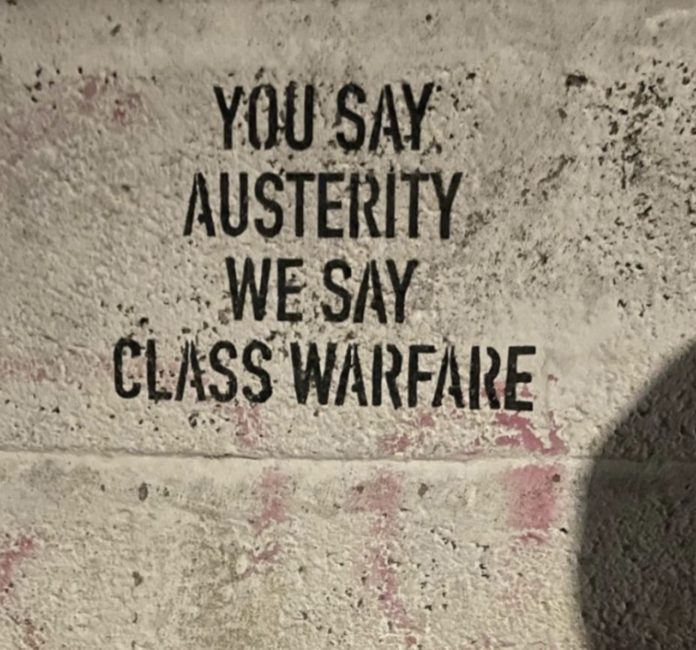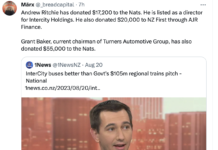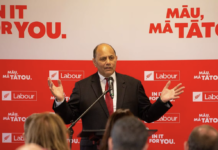Left wing people, and lots of middle class voters, are scared of economics because it seems unpredictable, it’s full of numbers and if money is ‘lost’ we’re poorer and that’s serious. We all know you need money to run the economy, but left wing people feel that’s not something they know about; but business people claim they know all about money and how to ‘make it’.
Being capable about money wins elections, because voters worry about economic unpredictability and think we need a safe pair of hands so they aren’t plunged into poverty, so they accordingly vote ‘safe’. So left wing politicians want people to see them as a safe pair of hands, so they feel they have to listen to economists because they are supposedly the ring masters of the economy circus. In essence they are listening to very similar advice that is given to the right.
But it is this cautious safe pair of hands perception when voting that has created the monster of climate change and environmental damage that threatens our existence on earth. The safe pair of hands was voting for policies that have brought us to this ecological cliff.
In this 7 part series ‘Understanding economics’ I want to show you why economics doesn’t really know how to run the economy and gain wealth for everyone; though there are plenty of nut job neo-liberal economists who will tell you otherwise. I also want to show problems that arise from an excessive reliance on market economic theories. And in my second series ‘The people’s economy’ I’ll tell you what the left needs to do to run the economy efficiently and effectively.
We know economists (and by default politicians) don’t really know how to run the economy because almost all their predictions don’t come true. For example: The sanctions on Russian for invading Ukraine were predicted to quickly bring Russia to its knees. It hasn’t. Apocalyptic outcomes were predicted for people in the UK in 2016 if they voted for Brexit. There was no apocalypse, but Britain is now predictably declining. Economic leaders in power, like Alan Greenspan, did not foresee the massive 2008 economic crash, in fact he unknowingly helped bring it about. The recent surge and persistence of inflation was not predicted.
But who cares if economists don’t really know how to run the economy. These repeated failures of economics are a boon to fear mongering politicians and business groups about the sensitivity of the economy for making money/wealth. (Interestingly the root word for business comes from old english meaning ‘anxiety’). Business and politicians just want short term gains. Consider conservative commentators playing down climate action as too costly for business. And pushing for a do little emissions trading scheme (NZ ETS) when a carbon (fart) tax would have been so much more effective and the benefits would go to the government who could direct spending to shift the economy to carbon neutral.
Instead the NZ ETS gave the profit of capturing carbon credits to private investors who took the low effort option to plant pine trees, taking land out of active farm production; damaging our trading economy. And many investors probably spent their carbon credit profits on flying away for overseas holidays. Even the Maori tribes who planted trees on marginal land are backing a scheme that won’t help the planet. Private investors aren’t set up for moving the economy to carbon neutral. The private market fails as it is too small and uncoordinated on such a large scale problem; I accept there are some tiny positive stories.
The fear of inflation dominated the 2023 budget not climate change. The initiatives that supported people, like 50% subsidy on public transport for younger people, are about giving the money to a business who provides the services because giving money to people will stimulate aggregate demand and that pushes up prices/inflation. Giving money to a business supposedly won’t cause inflation because in the 2008 crash they simply typed zeroes behind the banks numbers and that didn’t cause inflation! (There is an explanation). And we can see fear of the economy in the recent decision not to take up a capital gains or wealth tax as an issue to campaign for in an election.
My point here in the series is to simply say there is uncertainty of prediction in economics, because economics is not a science, and that uncertainty creates fear of change and this fear is used to twist voters to vote against their own economic self interest by tricking them to think it is for their economic self-interest.
The result of fear of the economy and ultimately fear of losing elections means only minimalist economic steps are made and they are not dealing with the significant problems society is facing. Voters can see the need for change (poverty, cost of living, climate crisis) but nothing happens, and no policy direction is apparent. The economic policy differences between parties is tiny so there is little sense of choice on economics.
The consequence of this policy ineffectiveness and indistinction is that silly issues like law and order, immigration, not enough roads, become more important to voters as the explanation why society is the way it is. The left allows these issues to become the point of difference, the defining topics that suck all the energy out of the room when the real fear is the climate disaster. Labour is now trying to fight the election on the law and order ground National/Act have laid, when it is economic policies that have created all the significant societal problems we currently have like the climate crises.
But running the economy poorly is a winning strategy for the right because it causes economic fear. It doesn’t matter whether this is by design or stupidity because they are aligning with what most expect in how an economy is supposed to work so voters will forgive them as it could just be the unpredictability of the economy. National is the party of Growth.
But just go back to the 2010 Bill English and John Key, bragging about the NZ$15B of tax cuts how transformational it would be for the economy. The path to growth and Nirvana. Where? It was a hugely damaging budget to New Zealand society and government. Nobody feels better off and who looks back and thinks of any transformation except higher GST. How come? Nobody talks about that failure as a symptom of National policies. (They will claim a boom – but voters will laugh)
The party of progress/change is Labour. But where is the vision for economic change that is credible? They are trying to follow the same economic strategy of predictability. The fact is if Labour had a strong vision and it failed; the voters would forgive them because they are the party of change and they gave it a shot. To be a sitting duck is more damaging.
Next, let’s look at what history tells us about creating or accumulating wealth as that might help with a vision.





“….economics is not a science”.
I’ve heard this before. Not that I disagree entirely. But what does this then mean in a world increasingly searching for evidence-based solutions. Data is supreme, we are told. Especially quantitative data. What can be counted counts, does is not? However, irrespective of what kind of data, quantitative or qualitative, numbers or words, calculation or interpretation, all science, except perhaps for so science dependent on so-called natural laws of physical nature, involves a good amount of interpretation. Even quantitative data. And the saying goes, statistics (in other words quantitative data) are capable of lying.
If we accept economics is a ‘poor science’ what implications does this have for decision-makers? What does it mean for ordinary folk who are led to believe its all kosher. What does it mean for our ‘interpretation’ of how things really are? FFs, if nothing is the way it seems why should we even bother.
Look forward to the next installment.
it’s not even flawed science it’s the zombie repitition of failed ideology
Science in itself is rarely exact being subject to many outside influences.
There a riders to many scientific declarations for example “in a liquid at rest.”
Wind direction and speed influences the speed of a free falling body.
To expect economics to be absolute is to be silly.
bob the lefty your argument fails because neolib economists will tell you the rules are iron bound..like the fallacy that wages cause inflation (clearly not the case in nz) but never mention inconvenient results like greedflation
Hi gagarin, Like your comments.
The problem is that Economics is constructed with a few too many “ifs & buts”.
However, the basic principles are ok it’s just when you want exact predictions the problems start.
Hi Gary Peters, Many economists think the basics of economics aren’t great. Even demand and supply are highly flawed concepts. A good book to read is ‘Doughnut Economics’ by Kate Raworth.
Problem is just because its a numeric forecast that doesn’t make it a valid model of how the economy works. Often times an economic theory doesn’t reflect any observable mechanisms in the economy.
Take Reinhart and Rogoffs infamous growth in a time of debt paper. They inferred an 80% of GDP threshold after which economic growth is supposed to slow. Of course famously their basic analysis was so flawed that such a conclusion was entirely based on errors in their spreadsheet, so it was obvious the conclusion was incorrect. But more importantly they never tackled if slow growth causes high debt to GDP ratios vs if high debt to GDP ratios cause slow growth. We know about the obvious mechanisms where strong growth in economic activity causes govt debt to be paid down rapidly, these can be seen. On the other hand applying a threshold rule assumes that cause runs 100% in the other direction.
The economic costs of the European and US austerity drive (which has heavily influinced by this paper) run into the trillions of dollars.
Hi Nic the NZer, interesting info. Thank you
Of course economics is nothing like science. There’s no 2nd NZ economy that we can use as a control to see what happens if we raise/lower taxes, add/ remove subsidies or tariffs etc. There are only theories and data with nothing to truly compare them too.
Look at the most simple economic models like supply and demand. The model states if we raise the price of widgets the quantity will fall, everything else being equal. Now the real world doesn’t stand still so we can observe the changing relationship between price and quantity of widgets, but we have to obey these economic theories like they are as certain as the theory of gravity
Hi Bozo, thank you for your insight. Yes, which evidence to look at is important. My key point is economics has been looking too narrowly at evidence. Climate change is not something that can be ignored and the formulas and theories of economics have been ignoring it.
You are correct, economics is not science. It is a religion. It has several cults. It has cult figures: Keynes, Friedman, Marx, Marshal, etc. Instead of faith (belief without evidence) it has assumptions, assertions, presumptions, and pretending. It rejects evidence. Where is the evidence for the ends of the supply/demand curve?
Paul B has written a book which takes some layers off the Economics discipline – sort of like the Dance of the Seven Veils. So he speaks with prescience (that’s a new sort of science that we are in the process of learning about!)
Another book about economics – sounds interesting on Amazon as Paul’s doesn’t seem to be – should be a bestseller! https://www.goodreads.com/book/show/9049146-the-little-book-of-economics
The Little Book of Economics: How the Economy Works in the Real World
Greg Ip
One positive side-effect of the recent financial market meltdown that toppled giant, century-old institutions and cost millions their jobs is that it created a strong desire among many Americans to better understand how the U.S. economy functions. In The Little Book of Economics , Greg, Ip, one of the country’s most recognized and respected economics journalists, walks readers through how the economy really works. Written for the inquisitive layman who doesn’t want to plow through academic jargon and Greek letters or pore over charts and tables, The Little Book of Economics offers indispensible insight into how the American economy works – or, doesn’t. With engaging and accessible prose, the book A must read for anyone who wants a better grasp of the economy without taking a course in economics , The Little Book of Economics is a unique and engaging look at how the economy works in all its wonderful and treacherous ways.
Thanks Greywarbler, another great book is ‘Doughnut Economics’ by Kate Raworth. Or even easier to read is Rana Foroohar – virtually any book but Makers and Takers is very good about how we got where we are economically today.
Hi Paul+Bieleski, Great insights. But I think you are being too harsh on Keynes. His work has been greatly misunderstood. He changed the entire focus of economics onto the demand side of the economy. It was like Galileo realising the sun was the centre of the solar system. I’ll have more on him later.
” The recent surge and persistence of inflation was not predicted.”
Economists, natural philosophers, merchant bankers, kings, rulers, emporers and ordinary citizens have known for thousands of years that printing money or clipping coinage causes inflation. Entirely predicted.
Trillions quantively eased to create inflation to move real assets to the already wealthy, pay down debt to China and buy war.
.
If Alan Greenspan “did not foresee the massive 2008 economic crash” that he “unknowingly helped bring about”, we should be asking why.
In 1993, Greenspan requested a research paper directly from B.O.J. advisor Richard Werner, which predicted exactly this, in a similar way to Greenspan’s early writings on credit creation.
At the 1997 I.M.F. Annual Conference, Greenspan angrily dismissed Werner’s paper. However, Werner was later told by Fed insiders that some within the Fed were in fact predicting the exact same thing — and had anticipated the ’09 bailouts. This was partially reported in Japan in 2001, but totally suppressed (under U.S. government pressure) when Werner — the original pioneer of Q.E. — tried reporting it in English in 2003.
Hi Kristoff R, very interesting thank you.
Carbon credits are total baloney in my opinion.
But but we can hold our heads up high because we have the space to plant forests unlike many other countries
Every time someone clicks on ‘off setting carbon credits’ on the AirNZ site when booking tickets, AirNZ are the winners, they own a forest somewhere.
STOP flying, especially on overseas holidays, do something about rail.
Reduce our reliance on agriculture (50% of our emissions), specifically the bloody dairy cows (oh those poor poor farmers), don’t the farmers have children and grandchildren – or do they simply not care how we the privileged lot live and leave the appalling mess to our children et al.
Pine and forests of it in NZ. Fast growing but munchable and decaying-prone without toxic chemicals or expensive treatments that I think compress the wood. We in Nelson have dumped much sawdust impregnated with a bunch of nasty chemicals to build up the sand dunes. Storm weather has exposed it – it will cost possibly $20 mill to clear it and what will be put in its place, and where will it go? Nick Smith now our Mayor and before MP has interest in this because he ushered in dropping applying boron I think to internal housing timber. Stop the pine addiction. Send the pine-pushers packing – there’s a good protest sign!
The Farm Forestry group have been studying the use of trees for yonks, must have good ideas. And didn’t I read that hearty rimu etc has been felled clandestinely to get timber for actual use where it is profitable and wanted. Pine and hardwoods, less flammable woods interspersed would be the answer. And less likelihood of wipeout from some pest or disease spreading like ‘wildfire’ through the monoculture. (Requiring chemical control from the air – drones, planes.) And pine is readily flammable too isn’t it?
Farm forestry is a community of people that have been growing trees in New Zealand since 1957. We, as a collective, are the leading researchers of alternative species and support anyone that is keen on getting more trees in the ground.
NZ Farm Forestry – Home
nzffa.org.nz
https://www.nzffa.org.nz
(These people should be given superior orders of NZ/AO merit. Take the one off that chap who rogered us!)
Hi Michal, Great insights
If you spend more than you earn it ends in tears,is a simple truth,something the Labour Government are yet to understand.
Certainly true for households! In principle, spend more than you earn and you’re in trouble. But governments of all colours have a stronger hand to play with, do they not.
Bobbie, simple. An innocent defending the wily! You haven’t seen the other side of the coin yet?
HI Bob the first, I assume your comment applies to National building $25Billion on roads. Which is a huge underestimate of what the cost actually will be.
Brilliant stuff @ S.M. A personal thank you for going to the trouble of etc.
I’m very much looking forward to your future Posts.
My humble views here re our economy / climate are born of my simple mind.
Here’s my wish list, for a laugh.
Imprison then asset strip all multi-billionaires and multi-millionaires.
Deport the foreign owned banks then ban them from returning but if they do, then pop them into prison with the once were multi-billionaires and multi millionaires and their political minions.
Our farmers, and farming’s all be got, can feed, so it was reported here, 40 million people.
My family and myself moved from Southland where we had 650 acres running 2500 sheep to a 3000 acre property in mid Canterbury which was carrying 5000 sheep and 300 Angus beef cattle. With the exception of shearing our sheep we did everything else. My Mother, her sister, my father and myself ran that property efficiently and yet barely profitably for about 20 years providing wool and meat for export. Thanks to the natzo’s, farming’s about being price-takers not price-setters so consequently farming is effectively high-end slavery where everyone makes money except those who make the goods.
That means our farming primary industry carries the weight of our economy while it also returns enough foreign currency to have criminals wading knee deep in agricultural earned money to enable 14 multi-billionaires, 3118 multi-millionaires and four foreign owned banks the money they don’t deserve and must, in the near future forfeit then go to prison. ( I know. Sounds crazy, right?)
Then, we can pay urban city people a living wage to do as they please and still return billions returned as a First World agrarian economy with a state of the art agrarian infrastructure to keep our AO/NZ afloat.
Doesn’t that read like an insanity written by a nutter? Well, do the sums then get back to me.
P.S. Pine trees are fucking awful things to off-set carbon. Pine trees are in effect a con-job, a swindle. Fletcher Challenge? You have an opinion on that? Grow Indica Pot instead. That’s what happened in Kentucky leading into WW2. W.R.Hearst and his bestie Dupont created an entire mythology around cannabis to advance Dupont’s chemicals but they had to backtrack because of a pesky little event like WW2. True story. ‘The Hemp Revolution’ 1995. https://youtu.be/EdEfdS2DbJ0
I think economics has been, is, should be? part of the Humanities. It has never been hard science but has empowered a lot of knowledge that business and government dips into but government not enough, well enough applied and not using all the Humanities subjects in tandem. The leaders, PTB tend to go to a default authoritarian and judgmental position that enables little parts of the humanities (with a small h) to rise like triffids, and lurch across the landscape of our minds. (Could someone make up a song about that – could have a punch.)
I think we will have to stop concentrating on the hard sciences and bring economic facts to mind, combining with creative ones. Then we can devise ways of surviving the hell we have brought upon ourselves as we have disrupted the ancient forces of our world.
Country/rural people have said for yonks that townies have a void of ignorance about farming. Then let them live in little groups on farms attending to the waterways and growing their own vegetables and being a stationary workforce when needed. Now that would revitalise the hollowed-out rural hamlets. That would balance van de Molen’s (Windmill) ideas, and Groundswell that he supports.
https://www.rnz.co.nz/news/the-wireless/374955/what-s-it-like-to-be-young-and-blue
Well, actually, it is a Science – The Science of Common Sense. It is not an ‘exact’ Science’ – it is a social science. Economics is marvelous. It explains everything we do and why we do it. But, pseudo intellectuals and the avaricious of the Right don’t understand it…..it is perfect. We live in ‘societies’ – economic systems. Societies are interdependent. All we really need to know is that excess focus on any specific economic philosophy doesnt work – because humandkind is really really stupid!
Comments are closed.